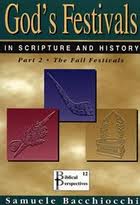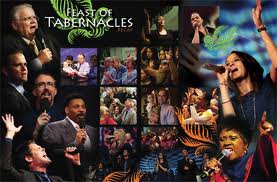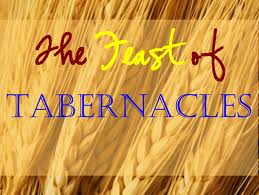Leviticus 23: Times of Refreshing
 Saturday, September 29, 2012 at 5:00AM
Saturday, September 29, 2012 at 5:00AM The festivals of Leviticus 23 provide their observers with many benefits. One benefit is mentioned by prolific writer and blogger Pam Dewey in her site "Times of Refreshing." God has provided us with a great series of vacations! If you are looking for more information on these festivals greater than the brief overview I plan here, I recommend a road trip to http://youall.com/refresh/.
 Dr Bacchiocchi's book on the Fall festivals of Leviticus 23
Dr Bacchiocchi's book on the Fall festivals of Leviticus 23
These festivals include: the Sabbath, Passover, Pentecost, Trumpets, Atonement, and Tabernacles.
What is interesting is that Most Christians already observe two of these festivals, Passover and Pentecost. I can hear some of you saying, "What!? I have never observed Passover, that's Jewish." You have observed it under a different name—you call it Easter. Only in English and German is it called Easter. (The name is derived from the Teutonic Goddess of the Dawn Eostre.) In the Romance Languages, and for that matter in Russian, it is called Passover.
Many Christians are uncomfortable with the name Easter, and the pagan customs associated with modern Easter like Easter Eggs, the Easter Bunny, and the Easter Basket. So some have adopted the name "Resurrection Sunday." Although I would quibble and say the resurrection was on Saturday night, I do not want to be critical as this is a big step in the right direction.
Historically this was a big, big issue in the early Church. At first Christians observed Passover at the same time as the Jews. For various reasons this was transferred to Sunday. This process took centuries. There was a lot of animosity toward the Jews, and the main reason for the change was to avoid having anything to do with them. I have always felt that this was an inadequate reason and eventually joined with those that keep the Passover in the same general time that the Jews do. (We do it as a three day celebration centered around the traditional date of the Passover. We begin by reenacting the Last Supper by doing what was done on that night; the following night on the traditional Passover night we have a meal; the next day we celebrate the beginning of the days of unleavened bread, which we celebrate for 7 days.)
Pentecost comes 50 days later. I remember keeping it even when I was a Baptist. Over the years I have been bemused by the criticism I have received for observing these days from those who observed these days themselves without realizing it!
 There are three Fall Festivals that are not generally observed by Christians. Although as you can see by the photo, some prominent TV evangelists do. These three feasts are: Trumpets, Atonement, and Tabernacles. Both the Hebrew Scriptures and the Greek Scriptures that make up our modern Bible provide interesting meanings and thoughts to ponder on these days. For a chart on Pam Dewey's site where these days are summarized, click here.
There are three Fall Festivals that are not generally observed by Christians. Although as you can see by the photo, some prominent TV evangelists do. These three feasts are: Trumpets, Atonement, and Tabernacles. Both the Hebrew Scriptures and the Greek Scriptures that make up our modern Bible provide interesting meanings and thoughts to ponder on these days. For a chart on Pam Dewey's site where these days are summarized, click here.
I remember my first exposure to these days. I was in the 6th grade in Palm Springs and I noticed that about 20% of my class was missing. It was one of the Fall festivals, probably Atonement.
So for the next couple of weeks I will be blogging about these days, and in particular the Feast of Tabernacles, and the details of modern festival observance using the principles I mentioned yesterday. Hopefully many of you will find it of interest.





